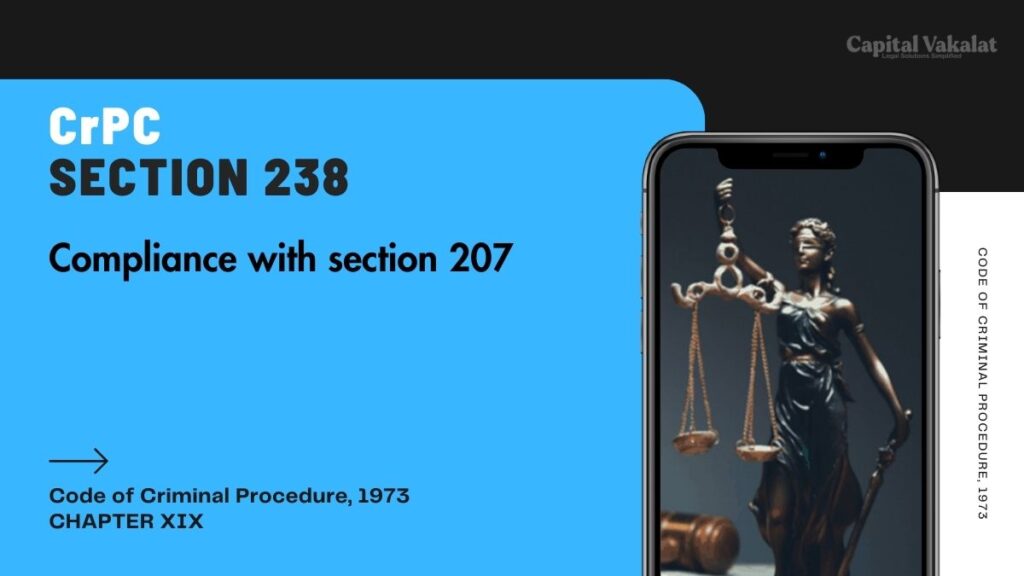The criminal justice system in India is an intricate tapestry woven with various laws, procedures, and protocols designed to ensure fairness and transparency. Among these, Section 238 of the Criminal Procedure Code (CrPC) holds a significant place, particularly when it comes to the compliance requirements set forth in Section 207 CrPC.

This article delves into the nuances of Section 238, its interplay with Section 207, and the critical importance of adherence to these legal provisions.
Bare Act. Section 238 Cr.P.C.
Compliance with section 207.
When, in any warrant-case instituted on a police report, the accused appears or is brought before a Magistrate at the commencement of the trial, the Magistrate shall satisfy himself that he has complied with the provisions of section 207.
Section 238 CrPC: An Overview
Section 238 of the CrPC deals with the procedures to be followed when the accused appears before a magistrate for the first time. This section mandates that the magistrate must ensure compliance with the provisions of Section 207 CrPC, which entails the supply of documents to the accused. The goal is to uphold the principles of natural justice and fair trial by ensuring that the accused has access to all relevant documents pertaining to the case against them.
Compliance with Section 207 CrPC
Section 207 of the CrPC is a cornerstone of the criminal justice process, stipulating that the accused must be furnished with copies of the police report, the First Information Report (FIR), and other relevant documents. This provision ensures that the accused is fully informed of the evidence and charges they face, enabling them to prepare an effective defense. Compliance with Section 207 is not merely a procedural formality but a fundamental right of the accused.
The Importance of Compliance
Ensuring compliance with Section 207 CrPC is paramount for several reasons. Firstly, it upholds the accused’s right to a fair trial by providing them with the necessary information to challenge the prosecution’s case. Secondly, it prevents unnecessary delays in the judicial process, as non-compliance can lead to adjournments and legal challenges. Lastly, it reinforces the credibility and integrity of the judicial system by adhering to established legal norms.
Challenges in Compliance
Despite its importance, compliance with Section 207 CrPC often faces challenges. These can include administrative delays, inadequate resources, and lapses in procedural adherence. Such challenges can undermine the accused’s right to a fair trial and lead to miscarriages of justice. Addressing these issues requires a concerted effort from all stakeholders in the criminal justice system, including the judiciary, law enforcement agencies, and legal practitioners.
Ensuring Effective Compliance
Effective compliance with Section 207 CrPC requires a systematic approach. Law enforcement agencies must prioritize the timely and accurate documentation of evidence. Judicial officers must vigilantly oversee the compliance process, ensuring that all necessary documents are provided to the accused. Additionally, legal practitioners must advocate for their clients’ rights and promptly address any lapses in compliance.
Case Law and Judicial Pronouncements
Several landmark judgments have underscored the importance of compliance with Section 207 CrPC. Courts have consistently held that non-compliance can vitiate the trial process and result in the acquittal of the accused. These judicial pronouncements serve as a reminder of the critical role that compliance plays in upholding the principles of justice and fairness.
Conclusion
In conclusion, Section 238 CrPC and the compliance requirements of Section 207 CrPC are integral to the fair and transparent functioning of the criminal justice system. Ensuring that the accused has access to all relevant documents is a fundamental right that must be upheld at all costs. By addressing the challenges and prioritizing effective compliance, the legal community can reinforce the integrity of the judicial process and safeguard the rights of the accused.